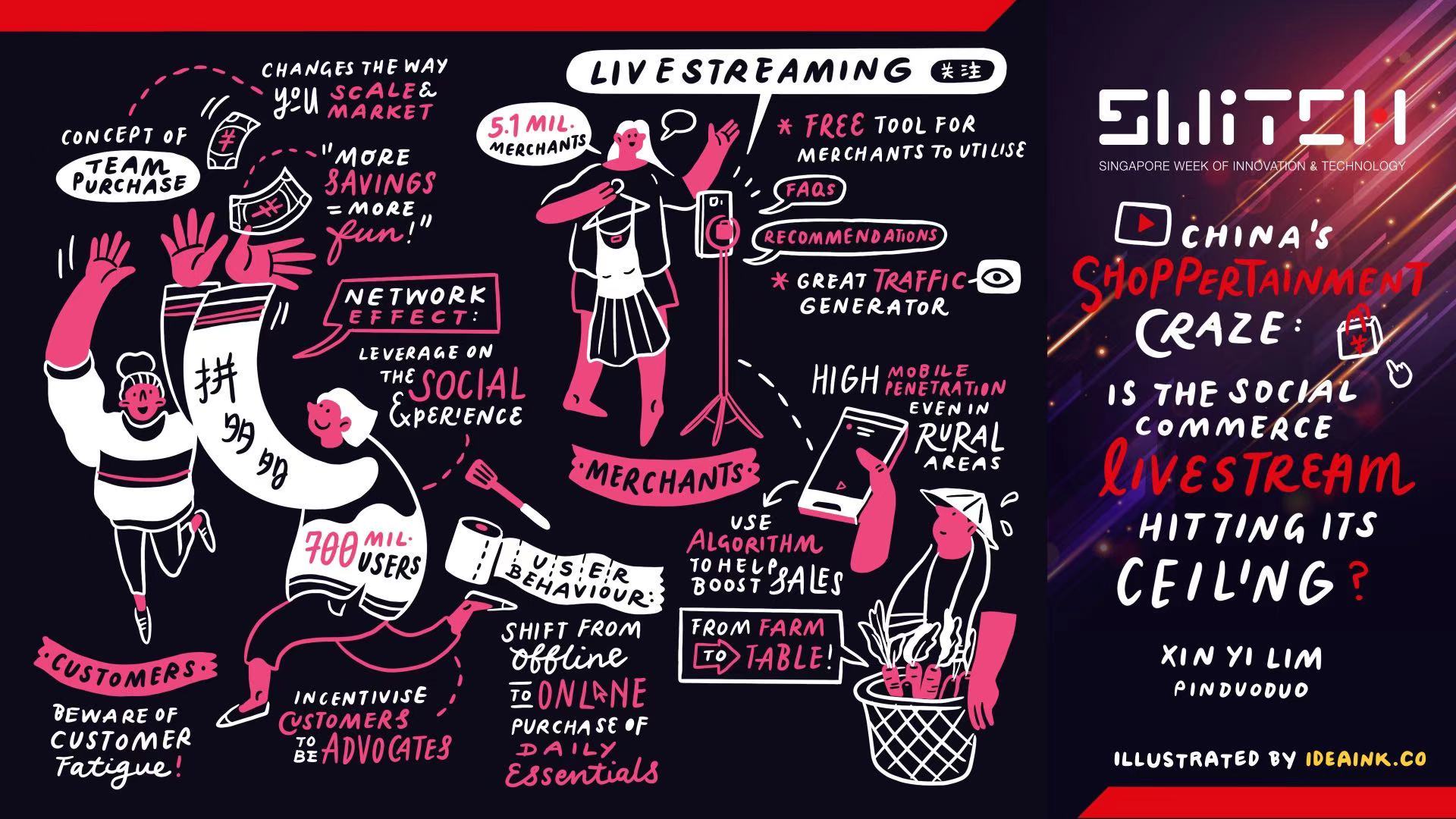Livestream e-commerce has reached dizzying sales figures, and optimism is rife. However, the sector may have hit its limit. The hype around livestreamed e-commerce is threatening its sustainability, especially as regulators set their sights on the sector.

We have seen e-commerce grow and reach places and heights that we would never have imagined. One of the more recent strategies that have been integrated with e-commerce is adding a social aspect to your online shopping. In this panel, Chinaaccelerator Managing Partner Oscar Ramos moderates a conversation on Social Commerce Livestreaming with Pinduoduo Executive Director for Sustainability and Agriculture Impact, Xin Yi Lim.
Lim and Oscar discuss how this “Shoppertainment Craze” has grown and how Pinduoduo has played a huge part in creating the landscape in which Chinese tech titans are now utilizing. They also discuss how this new platform has created a unique way for merchants to reach their audience, generate free marketing, and how the coronavirus pandemic has greatly affected e-commerce.
How does e-commerce become social?
Pinduoduo is the pioneering interactive e-commerce platform that brings a social aspect to your online shopping experience. They aim to give you a fun experience and with friends as all of you save money together. Founder Colin Huang Zheng said that they want Pinduoduo to be like CostCo and Disney combined–savings and fun put into one package.
Pinduoduo follows a unique team purchase model. On this platform, people who know each other buy a particular product together at a larger quantity to get a higher discount. This model incentivizes users to convince their friends and family to buy a specific product with them. Pinduoduo utilizes the most prominent social media/chat super-app, WeChat, to have their users reach out to their contacts and make their platform go viral.
Lim goes more into detail with their platform and set themselves apart from different platforms by going back to their Costco+Disney philosophy. They are a discovery platform that pushes recommendations that consumers find very useful. They try to be as fun and engaging as they can when it comes to their user experience.
Why livestreaming?
Simply put, Social Commerce Livestreams open up a channel for consumers to reach merchants. One of the more significant hindrances for people to buy online is not seeing the product in person. This allows the merchant to answer any questions or concerns these consumers may have. Lim brings up clothes as an example, wherein customers are always unsure about what size they should get. Having this livestream channel allows the customer to see how it actually looks and how big a small would look next to a medium.
They encourage their enrolled merchant to do these live streams themselves to increase their sales performance. It is a tool on their platform that should be efficiently utilized. Creating this connection between merchants and customers can also give parties a better sense of trust regarding unique and higher value items. Lim then brings up items such as jewelry and furniture, which most people wouldn’t be inclined to buy online. Adding this social element will alleviate some stress when it comes to this.
How has COVID affected e-commerce?
When it comes to Pinduoduo, they were fortunate to have launched their live streaming tool for all merchants earlier this year in January. The coronavirus pandemic has posed a considerable problem with several platforms, but e-commerce quickly adapted. Lockdowns imposed all over the world have made it harder for consumers to buy what they need. With the live stream tool available in Pinduoduo, merchants could generate more traffic in their platform by reaching out to celebrities to appear on their channel.
In the bigger picture, consumers who were foreign to e-commerce were forced to adapt due to the lockdown. The pandemic has brought an entirely new wave of users who rely on e-commerce platforms to get products such as daily essentials from FMCGs and fresh produce, which consumers would usually purchase in physical stores. Lim does not see this as a trend and explains how the sales for fresh groceries in e-commerce have been steadily increasing. This sudden boom in sales for these necessities is most likely here to stay, and some physical stores may have to restructure in the future to include fulfillment of online sales as one of their new services.
Where is interactive e-commerce headed next?
We have seen how Pinduoduo has continuously grown and adapted horizontally to create new and different categories and models for consumers in interactive e-commerce. With the influx of new users and these tech giants’ imaginative minds, it seems highly unlikely that these companies have hit the ceiling.
Xin Yi Lim is the Executive Director, Sustainability and Agricultural Impact at Pinduoduo. She is responsible for Pinduoduo’s international corporate strategy efforts and innovation in sustainability and agri-tech. Before joining Pinduoduo in late 2018, she worked for Singapore’s sovereign wealth fund, GIC, in both its Singapore and New York offices as a technology and media analyst in its Public Equities division. Xin Yi holds a Bachelor’s degree from the University of Oxford and a Master’s degree from Harvard University.
Oscar Ramos, Partner & Managing Director of Chinaccelerator, is a “full-stack innovator” with expertise ranging from product development to corporate strategy. He is an experienced entrepreneur, management consultant, and early-stage investor. After getting his Master of Engineering in Telecommunications, Oscar dropped out from his Biomedical PhD program and chose to begin his career as a R&D engineer in Spain.
He started off in Ericsson’s Research Center and later joined Telefonica. He then transitioned to the world of medtech startups after discovering Business Model Innovation in his previous position. His passion for innovation also propelled him to move to China in early 2008. Since then he has been involved in various areas of innovation such as product launching, go-to market strategies, venture capital financing, and M&A.

